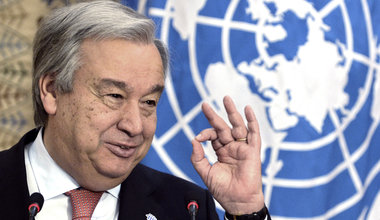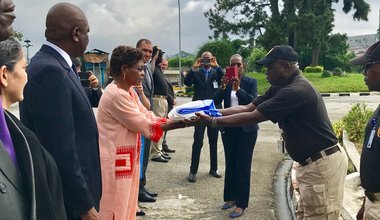Daily Brief on Côte d’Ivoire for Wednesday, 29 October 2008
Highlights
- "Patriots" threaten UNOCI team visiting identification centre in Abidjan
- Identification operation in Bangolo may be delayed due to threats
- Redeployed civil servants threaten to leave Forces Nouvelles areas
- UNOCI staff prevent lynching of man accused of witchcraft
Electoral process
A UNOCI team visiting identification and voter registration centres in Abidjan yesterday was threatened by a group of 50 youths in Port Bouet, who took their camera and told them to stay away from the area because it was their parliament. They said they were patriots. The team called the UNOCI security, which sent a Security officer, who however failed to persuade the youths to hand back the camera. The military team was obliged to leave with out it.
UNOCI has received reports that the start of the identification and voter registration operation in the western town of Bangolo, may be delayed following threats from the Young Patriots in the area that they would destroy any voters' list that contained the names of people who are not from the town. UNPOL also reported that the relationship between them and the youths had deteriorated after a proposal for a Quick Impact Project (QIPs) they had submitted was rejected by the Mission's QIPs committee. According to the youths, UNOCI is financing QIPs all over Côte d'Ivoire but has chosen to exclude Bangolo. Meanwhile, equipment was stolen on Friday night, 24 October 2008, from an identification and voter registration centre in Abidjan's Cocody neighbourhood.
Redeployment of administration
The General Secretariat of the Forces Nouvelles convened a meeting today in Bouaké with the representatives of the associations of redeployed civil servants to examine the situation of civil servants working in areas under its control. The meeting coincides with an ongoing strike by civil servants in Korhogo, Ferkéssedougou and Boundiali in northern Côte d'Ivoire. The associations are protesting against the "violent repression" and the "ill treatment" endured by their members in Korhogo, on Friday, 24 October 2008, when soldiers from the Armed Forces of the Forces Nouvelles (FAFN) tried to stop a demonstration by the civil servants in the town. The protest was against the non payment of their redeployment allowances. Yesterday, the strikers in Korhogo, Ferkéssedougou and Boundiali announced their decision to request a "collective transfer out of the areas", in the event that a satisfactory solution is not found. The strike which started on 27 October 2008, is due to end on 2 November 2008. A go slow and interruptions to services have been observed in various schools, local government offices and hospitals in the three cities.
Security
UNOCI military and civilian staff on 25 October 2008, succeeded in preventing the lynching of a 44-year-old man who had been severely beaten by youths in M'bré-Nzué village, 15 km south-east of Bouaké, who accused him of killing another villager through witchcraft on 21 October 2008. The victim underwent medical treatment in Tiéplé medical centre.
Villagers in Mlongouine, near Danané (west) yesterday told a UNOCI patrol that the security situation in their village is very bad. According to the village chief there have been several robberies with the most recent being on 12 October 2008 when the thieves burgled the house of the principal of the local school. The burglars fired shots into the air to deter villagers from going to his aid before escaping with numerous items from the house. The villagers asked UNOCI to increase its patrols in the area.
Attacks against public transport vehicles and private homes by unidentified armed individuals, and the raping of women during these incidents, continue unabated in the western and northern parts of the country. On 23 October 2008, a bus was ambushed near Yabligue village, 44 km north of Duékoué (west). During the night of 25 October to the morning of 26 October 2008, a woman was raped by two masked individuals during an armed robbery in her house in Korhogo (north). The assailants attacked a neighbouring house on the same night, escaping with 57,500 FCFA (around $112), several mobile phones and other personal belongings. In addition, three women were raped in Grand Pin village, near Bangolo (west) during a roadside robbery on 21 October 2008 in which the driver of the vehicle was injured.
Military
UNOCI Deputy Force Commander Brigadier-Genera El Hadji Mouhamadou Kandji went to Conakry, Guinea today to give a briefing to chiefs of staff of the Economic Community of West African States (ECOWAS) on the security situation in Côte d'Ivoire
Arms embargo
UNOCI peacekeepers yesterday successfully carried out arms embargo inspections at the FAFN's 54th Battalion in Vavoua, near Daloa (centre-west), at its battalion in Vargbo (north) and at the Defence and Security Forces of Côte d'Ivoire (FDSCI) Gendarmerie Camp in Toulepleu (west).
Human Rights
The Regional Human Rights Office in Abidjan, on 27 October 2008, received a 34-year-old lecturer at the University of Cocody-Abidjan, who was severely beaten up at the campus on 13 October 2008 allegedly by 12 members of the student organisation 'FESCI-FLASH' (FLASH : Faculté des Lettres, des Arts, et des Sciences humaines). The victim underwent medical treatment for injuries to his wrist and lodged a complaint against his attackers at the Gendarmerie in Cocody. No action has been taken so far. Members of the University Teachers Union "Coordination Nationale des Enseignants et Chercheurs du Supérieur" (CNEC) went on a week-long strike on 27 October 2008 to express their condemnation of alleged abuses perpetrated by FESCI members.
The Regional Human Rights Office in Duékoué, along with colleagues from the Public Information and Electoral Assistance Divisions, celebrated African Human Rights Day in the village of Tuambly (130 km west of Duékoué) on 24 October 2008. The day's activities included a a sensitisation session on tolerance and peaceful cohabitation, aimed at facilitating the safe return of internally displaced persons (IDPs) to the area. It was attended by 120 villagers from the Guéré, Malian, Burkinabé, Guinean, Baoulé and Yacouba communities.
 ONU
ONU Nations Unies Maintien de la paix
Nations Unies Maintien de la paix



